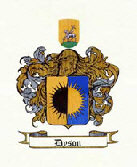Dyson Family of Worcestershire

© Jeff Dyson - November 2006
I nominate and appoint William Brooke, clerk, and my neighbour John Mansell overseers of this my last will and testament. Lastly, I constitute ordain and appoint my son Christopher Dyson sole executor of this my last will and testament revoking all other wills and testaments in witness thereof. I the said Henry Dyson, the elder, have hereunto set my hand and seal the day and year first above written. It is my will that my 3 Grandchildren, Henry Dyson, John Dyson and Christopher Dyson sons of the said Christopher Dyson, shall upon the next day after my funeral, seize upon the said three estates above mentioned given unto them.
It’s my will that William Brooke and Mrs Brooke shall have 20/- equally dived betwixt them.
(signed) Henry Dyson and several witnesses
Henry’s father was Francis Dyson who was born in Inkberrow and married Bridget Hunt by Licence on 17 February 1585 at Stock and Bradley the Licence having been granted at Worcester. Bridget was ‘of Hanbury’ and Francis ‘of Inkberrow’. The Marriage Bond is signed by Francis’s elder brother Henry, as his father, Lewis had died at the time of the marriage. Bridget was only 15 years old at the time of the marriage but the age for marriage at this time was fourteen for boys and twelve for girls. Henry appears to be the only offspring of this marriage.
Francis’s father was Lewis Dyson, his first wife was of the surname Baker and from Hillcourt Worcester. Lewis had seven children by his first wife, Henry, Margery, Mary, Alice, William, Francis, and John( also known as James) After the death of his first wife he married Margery Hunt nee Fincher, the widow of Robert Hunt. There were no children of the marriage. Lewis died on 3 December 1581 and his will made in 1580, was proved in 1583, the details of which are as follows;
It’s my will that William Brooke and Mrs Brooke shall have 20/-
(signed) Henry Dyson and several witnesses
Henry’s father was Francis Dyson who was born in Inkberrow and married Bridget Hunt by Licence on 17 February 1585 at Stock and Bradley the Licence having been granted at Worcester. Bridget was ‘of Hanbury’ and Francis ‘of Inkberrow’. The Marriage Bond is signed by Francis’s elder brother Henry, as his father, Lewis had died at the time of the marriage. Bridget was only 15 years old at the time of the marriage but the age for marriage at this time was fourteen for boys and twelve for girls. Henry appears to be the only offspring of this marriage.
Francis’s father was Lewis Dyson, his first wife was of the surname Baker and from Hillcourt Worcester. Lewis had seven children by his first wife, Henry, Margery, Mary, Alice, William, Francis, and John( also known as James) After the death of his first wife he married Margery Hunt nee Fincher, the widow of Robert Hunt. There were no children of the marriage. Lewis died on 3 December 1581 and his will made in 1580, was proved in 1583, the details of which are as follows;
Will of Lewis Dyson of Bradley 3rd May 1580
Probate was granted on this will in 1583 by the PCC- Perogative Court of Canterbury. Few wills were administered in this way, usually wills of rich, notable people. The original will, held at Somerset House in London was destroyed by them, due to “lack of space.” However the following will extracts were microfilmed before destruction. A Yeoman is a freeholder of land, a farmer with a large acreage or a major tenant rather than a freeholder.;